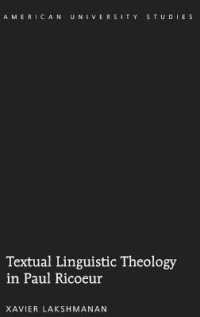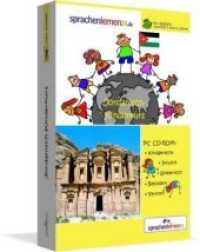- ホーム
- > 洋書
- > 英文書
- > Literary Criticism
Full Description
"Will you not memorize a little poetry to halt the slaughter?" the Palestinian poet Mahmoud Darwish wrote. Darwish's poetic statement points to world-evacuating and genocidal violences - in a triangulation of Palestine, Iraq, and the American settler state - as his language recalls us to a sonority in utterance and acts of refusal in collective form. Through readings of Arabic and Arab poetry, art, translation, and philosophy, Jeffrey Sacks illumines an indetermined, non-accumulative, non-propertied manner of lingual doing - across post-Ottoman topographies and states, and in excess of any single language - where language is a practice in sociality, the social is indistinct from the ontological, and being is a poetic mode - what this book calls "poeticality."
Poeticality studies the Lebanese-American poet and painter Etel Adnan, the Iraqi poet and translator Khālid al-Maʿālī, philosophers in the Arabic peripatetic tradition, and writings of Karl Marx, Paul Celan, Walter Benjamin, and others, to demonstrate a sense of form wholly other than what is advanced in self-determined social existence, linguistic self-understanding, and philosophical self-representation - a manner of address and a social pose, which Sacks summarizes under the heading "settler life."
Settler life - a form of life, a practice of reading, and an asymmetric distribution of social destruction - asserts itself as a generalized and regulating attack upon Black and Indigenous life, and upon all forms of nonwhite, non-Christian, non-heteronormative existence. "Everything is in the language we use," the Oglala Lakota poet Layli Long Soldier has written. This book—learning from Long Soldier's observation and with Darwish's sense of the poetic—affirms the demand for Indigenous sovereignty, in Palestine, in Turtle Island, and elsewhere, a demand which, through the collective acts occasioned in it, decomposes and deposes all sovereign forms and all stately legalities, in refusal of settler life.








